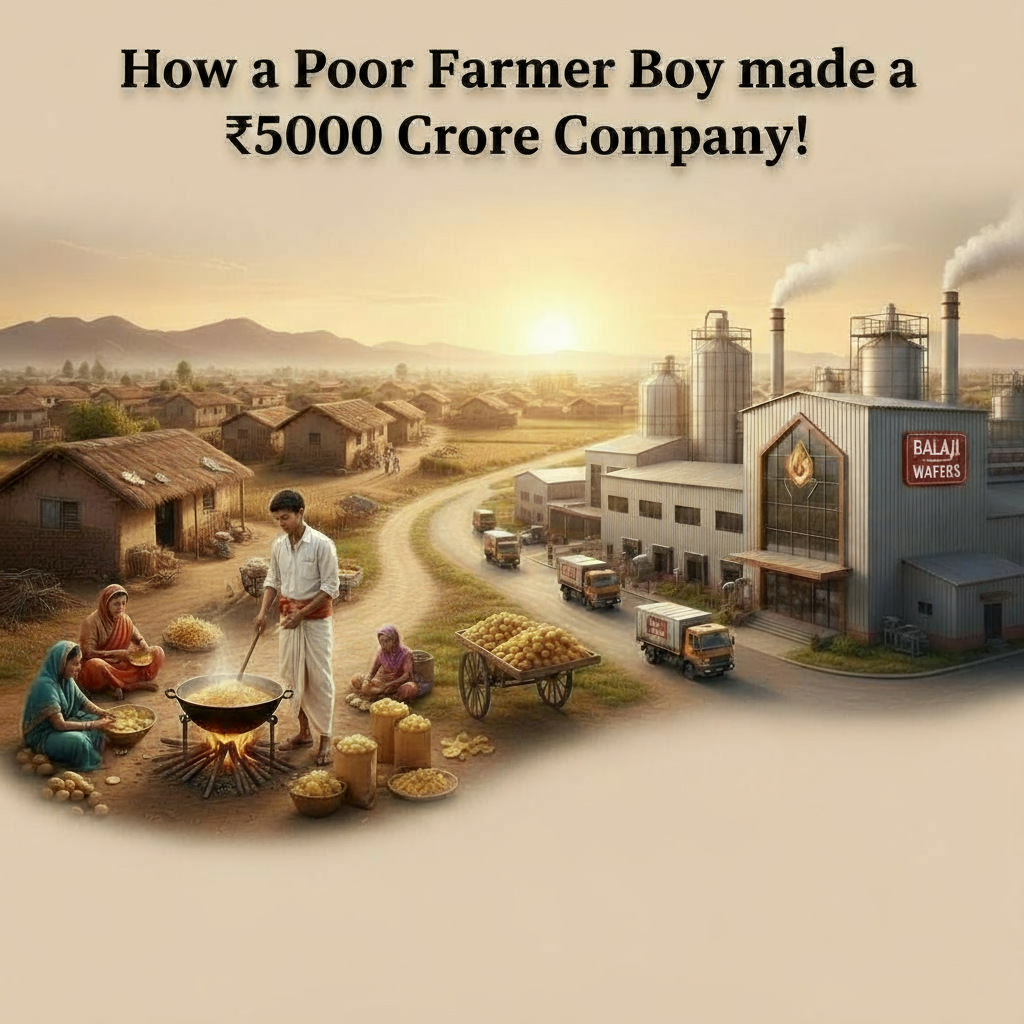Hello friend, this is a story from the early 1970s. In Jamnagar district of Gujarat, there was a small village, Dhundhoraji, with a population of around 1,500–2,000. The Virani family lived there. Everyone in the village was a farmer. The Viranis were also among those poor farming families who didn’t even have a bicycle. Wherever they had to go, they went on foot. There was no electricity in the entire village. People accepted this poverty as fate. In summers, sometimes a vendor from outside came selling ice golas; children would eat a 5-paise gola or peanuts. Villagers grew crops on their land. They sold the harvest and lived on whatever it brought—just enough for two meals a day.
But once, looking up at the sky, their eyes went dry—because the rains didn’t come. Their crops shriveled up. When it finally rained, it came two months late, giving them hope again. They mustered courage and sowed again. But once more, the rains betrayed them. This time, even the new sowing dried up. It was drought.
Can it be imagined, friends? A 15–16-year-old boy living in such a village, in such conditions, would one day become a billionaire. It sounds unbelievable, impossible—but this story is true. It is the story of a family that battled drought, and 50 years later entered Fortune India’s list of FMCG billionaires. This is the story of Balaji Wafers—founded by three brothers, Bhikhubhai, Kanu Bhai, and Chandu Bhai—which today challenges giants like PepsiCo.
Balaji Wafers’ annual revenue today has reached about ₹6,000 crore. Can one imagine building a business that big? It feels difficult to even picture. Because to do that, one must start somewhere—and there are always ten reasons not to start: no money, no understanding of business, don’t know the work, don’t know the passion. But after watching this video, perhaps no excuse will remain. If one watches carefully till the end, it might truly change a life—because real stories this inspirational and motivational are rare. This is one of them.
Let’s go back in time. In the 1970s, a poor farming family lived in a small village. In that same village lived a 15–16-year-old boy, Chandu Bhai Virani. When drought hit the village, his father, Popatbhai Virani, decided to sell their dry land. After selling the land, he gave money to his sons and said, “There’s nothing left in the village. Go out, make your own living.” Chandu Bhai recalls that their father sold everything. This placed a responsibility on them—they felt the trust their father had placed in them must not go to waste; they had to do something. The youngest brother, Kanu Bhai, stayed in the village with their parents and two sisters, and the other three brothers—Bhikhu Bhai, Chandu Bhai, and Meghji Bhai—set off for Rajkot city with a few rupees in their pockets and dreams in their eyes.
Since they were from a farming family, their first thought was to do something related to it. They started a business of farm equipment and fertilizers—but were cheated; a trader sold them fake goods. They had little business understanding. Their business collapsed within two years. They then thought of starting a dairy retail outlet—but with their money gone, that dream sank too. How could they face their father now? The brothers decided not to return to the village. Whatever they had to do, they would do there. But immediately there was the question: how would they survive, how would they eat? Another problem—Chandu Bhai had studied only up to Class 10. What job could a 10th-pass get? They searched a lot for work. Finally, in Rajkot’s Astron Cinema, they found a small job—as a canteen boy. The job was to serve food to people in the cinema canteen.
Here comes the first life lesson: duty in work. They never thought of work as small or big. Whatever job one gets, do it honestly. So beyond the canteen boy’s work, they also pasted film posters, checked tickets at the door, and helped manage audience entry in the hall. They never demanded extra money from the owner for extra tasks. After night shows, they even repaired torn seats. In return, they got a plate of chorafali with chutney to eat. At this time, they lived in a rented room. The monthly salary was ₹90 for Chandu and ₹150 for his brother—₹240 total, barely enough to get by. Once, they had to quietly slip away at night from the rented place because they didn’t even have ₹50 for rent. Later, they repaid the due rent and went to live with acquaintances.
There’s a saying in English: let your work do the talking. One doesn’t need to praise oneself—work speaks. Seeing the hard work and zeal of Chandu and his brother, their employer, Govind Khunt, said, “Now you people run the canteen.” Because they worked with such passion, he gave them the canteen contract for ₹1,000 per month. The year was 1976, when Astron Cinema was screening the Amitabh Bachchan-starrer Kabhie Kabhie. On screen, Amitabh sang “Kabhi kabhie mere dil mein khayal aata hai,” but Chandu had no time to daydream. The interval was only 5 minutes, in which orders had to be served with lightning speed. If any order couldn’t be delivered, he would go into the dark hall, find the customer, and serve right there.
A highly popular demand among customers was wafers—potato chips. But a serious problem arose. Their supplier couldn’t deliver per demand; deliveries were often late. So they changed suppliers. Still didn’t work. Tried a third supplier—same problem: irregular supply and mediocre quality. One supplier, second, third—yet regular supply was missing, and quality wasn’t great.
Here comes the second mantra: don’t worry, reflect. When faced with a problem, don’t panic—think. They say when nature closes one door, another opens. In the potato chips problem, they saw an opportunity—why not make their own potato wafers? The year was 1982. By this time, the family had sold everything in the village and shifted to Rajkot. They had bought their own house. The family supplied masala sandwiches to the cinema canteen—one of the most favorite items among customers. But sandwiches are perishable, spoil easily, while wafers last longer and can be packed and transported easily.
Here comes the third life lesson: jump in. Chandu says business is harder for highly educated people, because they overthink. They keep thinking—if this happens, then that; what if this, what if that—and get scared to act. Yes, one should first identify an opportunity, do market research, and if the basic model looks sound—then jump in. Chandu jumped in—metaphorically. He set up a shed in his house courtyard and put a kadhai (wok) on the stove. A peeler-slicer machine cost ₹10,000; he got a similar machine made for ₹5,000. Total investment: ₹10,000. He had no experience making potato wafers. So after finishing canteen work, he would experiment. He hired a helper, but the boy often didn’t show up. So Chandu himself stayed up nights frying potato wafers. In the beginning there was a lot of wastage, but he didn’t lose hope. Gradually he developed an authentic potato wafer. After many trials and errors, he created a taste that people liked.
By now they had three canteens—two at Astron Cinema and one at Kotécha Girls High School. Beyond internal supply to their canteens, they started stepping out: they gave packets to 25–30 shopkeepers. In 1984, they chose a brand name for their chips: Balaji Wafers. A little earlier, a small Hanuman temple had been set up near the cinema canteen; drawing inspiration from there, they chose the brand name.
But soon, trouble struck again. Shopkeepers began to harass them. Often, shopkeepers returned half-eaten packets claiming they were stale. When Chandu went to collect payments, some gave torn notes, others lied that they had already paid. But for Chandu, trouble meant reflection and solution—and learning through problem-solving. He and his brother strapped bags of wafers onto their bicycles and headed out to far-off villages and towns. Later, they did the same on motorbikes and rickshaws. The only need was to get the chips to customers once; thereafter, quality and taste were enough to keep people hooked.
In the next few years, their name spread across the city. The Virani brothers started earning ₹20,000–30,000 a month. Demand had grown so much that in 1989 they took a ₹50 lakh loan and set up a plant in Rajkot’s GIDC industrial area. At that time, it was Gujarat’s largest potato wafer plant. But troubles clung to them like Betal to Vikram’s back. The new machinery in the plant didn’t function properly. When they called company engineers, they’d hand them hotel bills—₹500 at a time. The blows of time force one into unexpected things. The brothers studied the machines and started repairing them themselves. The 10th-pass Chandu had become a part-time engineer.
A few years later, the business took corporate shape as Balaji Wafers Pvt. Ltd., with three directors: Bhikhu Bhai, Kanu Bhai, and Chandu Bhai. After that, they never looked back. Here comes the fourth life lesson. Chandu says people tried to stop Meera Bai, but she remained steadfast in her devotion. One needs such single-minded passion for one’s work—loving it so much that one can focus completely. That’s why, when an offer came to buy the company, they rejected it. At the time, they received more than 500 letters from customers who had grown up eating Balaji wafers. The letters pleaded: if you sell to an MNC, prices will go up and the taste might change.
Chandu says if they had been offered a partnership, they might have considered it—perhaps giving a 5–10% stake, but not more. They had thought Pepsi could be a good partner to learn governance policies and expansion—but later, they learned those things themselves. They hired strong professionals. Earlier, the maximum salary in the company was ₹25 lakh; later, they started hiring at ₹1.5 crore packages, bringing in top talent, including a project head from Pune with tank project experience. They canceled plans for an IPO as well. Their view is to progress steadily, like ripples moving forward in water. In Gujarat, they built their fortress; even Uncle Chipps and PepsiCo’s Lay’s couldn’t dent them there. An Economic Times article from 2009 reported that Lay’s and Haldiram’s visited to learn from them; Lay’s was impressed by the efficiency and simplicity of Balaji’s operations. The keyword in their operations is satisfaction—keeping everyone in the supply chain satisfied.
They buy quality raw material from suppliers and pay on time. Chandu told The Print that they have 2,000 suppliers, 80% of whom are farmers. He says business is not just for one’s own thriving—one must help those around as well. With distributors, dealers, and retailers, they keep such close connections that anyone can meet and talk to them directly. He proudly says the wealth of local distributors has grown alongside theirs. On salesforce.com, it’s described how they built a dealer management system to help distributors—automating monotonous tasks like record-keeping, improving billing visibility, and unifying previously scattered data from field visits, audits, spreadsheets, emails, and texts—so channel partners’ data became streamlined, enabling actionable insights.
As for their 7,000 employees, they are part of the team; everyone works from self-motivation. No one is given sales targets. Here comes the fifth life lesson: service, not sales. Chandu says sales means pushing the customer from one’s side—they don’t do that. Customers like their product so much that demand comes from the other side; they simply serve accordingly. In their dictionary, “sell” as in forcing doesn’t exist; “service” does—because the product gets consumed and finished; keep serving. In other words, it’s a pull strategy. Dealers don’t have to sell; they just deliver. He says people chase Lakshmi (wealth). But one should keep invoking Narayan (the divine) through work—where Narayan is, Lakshmi follows. Connect people, and wealth follows. Keep the team satisfied and give customers a quality product—business will grow, and with growth, profits will naturally come.
Today, Balaji Wafers’ profits are rising. They have four factories in India—Rajkot and Valsad in Gujarat; Indore in Madhya Pradesh; and Lucknow in Uttar Pradesh. Beyond chips, they sell over 50 snacks—nachos, aloo sev, sev-murmura, khatta meetha, mix namkeen, moong dal, Punjabi tadka, salted peanuts, chana jor garam, pop rings, and more. They are present in 14 states, and export to the UAE, Australia, and the USA. Nationwide, in the snacks market, they’re number three after PepsiCo and Haldiram’s, while in western India—Gujarat, Maharashtra, Madhya Pradesh, Rajasthan—they are dominant.
Even today, Balaji Wafers is a family business. Chandu’s brothers were with him; now their sons manage the reins. A natural question arises: did the brothers or the family ever get into blame games or fights? Chandu says: In the Mahabharata, people kept saying “mine, mine” and all were destroyed—“mera, mera” killed all. Our history also has the Ramayana: there, Ram told Bharat the kingdom is yours; Bharat said, no brother, it’s yours—and with this spirit of “yours,” everyone crossed over. So even if someone makes a mistake, don’t point fingers. Remember the team is working together. No one’s spirit should break. Assume one brother is a hero and three are zeros—but when three zeros stand after one, it becomes 1000. Leverage each one’s strength and work in cooperation. Even today, the family has lunch together at 1 PM around a very large dining table.
In this era of venture capital funding and fast-and-furious expansion, the story of Balaji Wafers is unique—it teaches that slow and steady wins the race. Chandu Bhai Virani says: we handpicked the raw material, processed it, fried it, seasoned it, packed it; sold on bikes, rickshaws, and tempos; then connected people, and gradually lakhs connected—because we learned everything and did everything ourselves, so today we understand every part of the business. So, make karma your dharma and work honestly. Find business opportunities based on interests. After market research, if it feels right, jump in, and run the business with a single-minded passion. Keep coworkers satisfied. Give customers great products at affordable prices. Troubles will come—where don’t they? But don’t worry; reflect.


